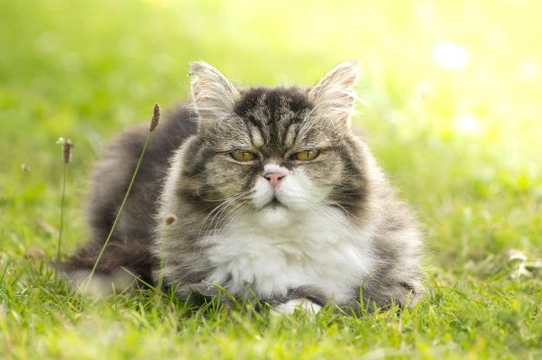
Health Issues Common to Older Cats
Cats are considered to be mature once they reach seven or eight, and will reach the feline equivalent of old age at around ten. Once your cat does reach old age, they will become more prone to a range of health and wellness conditions, and naturally begin to go into the slow decline that indicates their natural wind-down in the end stages of their lives.
As it is not uncommon today for cats to reach 15-20 years old or even older, all cat owners should be aware of the natural decline that their cats will go through as they age, and what they can expect from their cat’s aging.
Read on to learn more about the health issues and natural decline that accompanies aging in cats.
Obesity or weight loss
As cats reach old age, most of them will go through some physical changes in terms of their weight, muscle mass and build.
Old cats that continue to keep a good appetite but become more sedentary as they age may be prone to piling on the pounds or having some of their muscle mass turn to fat, leading to their being rather podgier than previously, and possibly suffering from obesity.
At the other end of the scale, loss of muscle mass, not being so active and becoming more picky about food and having a smaller appetite than before can also lead to older cats losing weight, and in some cases becoming quite thin.
It is important to feed a food that is specially designed for older cats, and to monitor your cat’s weight, to ensure that they are not too fat or too thin.
Joint stiffness and arthritis
Joint stiffness, the reduction of strong bone mass and bone marrow and generally, a decline in the flexibility of the bones and joints all commonly accompany old age, which can lead to older cats becoming rather stiff and creaky in their normal movements.
Arthritis, a painful inflammation of the joints, can also accompany old age, and possibly lead to your cat becoming more sedentary and reluctant to keep active. It is important to find out why your cat might be suffering from stiffness or arthritis, and take steps along with your vet to keep them comfortable and capable of moving freely.
Loss of appetite
As cats age and become less active than before, their appetites will tend to drop off somewhat too. This can lead to a loss of weight and condition, and it is possible that elderly cats will not be able to maintain the kind of weight and muscle mass that they naturally had when they were younger.
However, as cats get older, their senses decline too; this includes the sense of smell. As cats do not have particularly sophisticated taste buds, smell is one of the most important senses that they utilise to decide if something they are being offered to eat is nice and tasty, and so you might find that your cat turns their nose up at their previously enjoyed meals.
Tempting your cat to eat with particularly smelly foods can often help here, and you may have to try various different foods and put more effort than usual into tempting your elderly cat to eat enough.
Dental problems
Cats of any age can be prone to dental problems, and this is something that you should keep on top of and monitor throughout the life of your cat.
However, older cats with their older teeth are much more likely to have serious plaque, gum inflammation, or suffer from loose or missing teeth, abscesses, and pain when eating due to dental decline.
If your cat has bad breath, seems to be picky about what type of food they pick up and eat, or drop food that they eat from their mouths, schedule a veterinary dental procedure to thoroughly clean the teeth, and treat any painful or decaying teeth too.
Eyesight and hearing
As with older people, eyesight and hearing are two core senses that tend to decline with age. Older cats are more likely to be prone to cataracts and various other degenerative eye conditions, but as well as this, their eyesight will naturally become less acute than it was before. Their hearing too will become less keen, and the decline of both of these senses can mean that going outside and staying safe from hazards such as dogs and cars may pose problems.
Inside of the hours too, moving furniture around or moving home can prove problematic for a cat with failing eyesight and hearing, and so you should do what you can to minimise any changes within the home that might affect how your cat can navigate their world.
Health checks for older cats
Generally, cats should visit the vet for a check up and booster vaccinations once a year, to ensure that they remain in good health.
For older cats, check ups may need to be scheduled on a six monthly basis, or as and when needed by the cat. It is important to work with your vet and take their advice on keeping your mature or older cat as healthy and as well as they can be, and in order to identify any problems quickly and take steps to slow down their decline.
Once your cat reaches old age, ask your vet for a senior cat check up, and talk to them about how you can continue to keep your elderly cat happy, comfortable and well.



